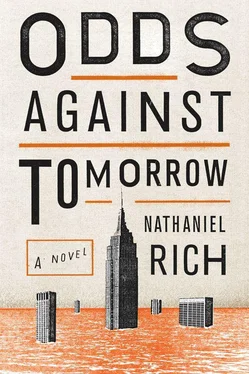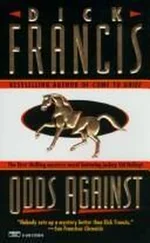“It is a dopey name, FutureWorld. But I’m glad you’ve found something that excites you.”
“Poor Laszlo. He was never the same man once they were done with him. If, after such an experience, you could even call him a man.”
Mitchell took a deep breath.
“I’m being paid eleven thousand dollars today and sixteen thousand dollars a month. That’s before incentives and bonuses kick in. It may increase when we take on more clients.”
“‘Yippie-kay-yay, motherfucker,’” said Tibor.
“Tibor!” said Rikki.
“ Die Hard , starring a certain Mr. Bruce Willis.”
Mitchell hung up the phone and looked around his apartment, as if for the first time. He had never given much thought to its appearance before — after work he tended to rumble directly to his bed and tip over like a felled tree. And he rarely saw the place by daylight. Not that it admitted daylight. He had only a single, grime-coated window in the living room, which faced the ramp leading from Third Avenue onto the Queens Midtown Tunnel. By day the window cast a narrow rectangle of light onto the floor; at night the tunnel’s marigold glow suffused the living room like a nuclear sunset. This was an unhappy apartment. It was not just depressing — it was itself depressed. The baleful wide-screen television glaring at the melancholy mouse-colored couch. The metal desk as heavy as a tombstone, supporting the computer’s glassy slab. The unvarnished teak coffee table supporting a pile of withered science magazines and heavily fingered books (on top lay Becker’s The Denial of Death : “The irony of man’s condition is that the deepest need is to be free of the anxiety of death and annihilation; but it is life itself which awakens it, and so we shrink from being fully alive.”). And in the corner of the room, the pelican mouth of the forlorn brown briefcase that Tibor had bequeathed him as a graduation present. Every object was despondent, numb, heavy with exhaustion.
Things outside weren’t any better. Seattle had inspired a new wave of street preachers to evangelize midtown Manhattan. They must have been having success with their donation boxes because they were fruitful and they did increase. They competed for the busiest intersections, standing across the street from one another, raising the volume on their loudspeakers until they drowned out the honking horns. They preached apocalypse and lifted signs written in magic marker: GOD IS ANGRY WITH THE WICKED EVERY DAY. THE STARS WILL FALL FROM THE SKY. IT REPENTED THE LORD THAT HE HAD MADE MAN ON THE EARTH, IT GRIEVED HIM AT HIS HEART. But it was the crowds that surprised Mitchell. They weren’t merely assembling — they were listening. This was a notable development in the world capital of cynicism.
Charnoble’s check arrived within the hour. Mitchell took it straight to his bank and decided to celebrate with a lunch at Chosan Galbi. On Lexington Avenue he passed a particularly animated preacher who balanced himself precariously in the basket of a shopping cart. He was cloaked in nothing but a brown canvas tunic cinched around the waist with a dirty string. Not a bad idea — it was another hydrant-bursting, brownout-warning, macadam-melting summer day, the kind of day when people went to movies for the air-conditioning. But this urban apostle had attracted a crowd, roughly a dozen people. They removed the pods from their ears, the sunglasses from their eyes, and peered up at this man. Even Mitchell paused.
“Meat?” said the preacher. The cart was unsteady beneath his feet, skipping on the pavement with each violent swing of his arms.
“Meat and bones and water?”
“No!” shouted a young woman, sitting erect on her bicycle seat.
“Is that all we are?” It was a loud voice, a rhetorician’s voice. He spoke like someone accustomed to standing at a pulpit in a mega-cathedral somewhere, lecturing a suburban congregation attired in their Sunday best. This shopping cart, his manner suggested, was only a temporary embarrassment. Sweat beaded under his eyes and dripped over his cheeks. The sides of him, visible through the tunic’s gaping armholes, were also wet.
“Intricately wired meat? Meat sending signals to meat through electricity? Where is the mystery in that?”
His audience nodded. It wasn’t just a performance. These people were paying witness. A feeling was building. An urban malaria, a future-affected anxiety disorder. Whatever kind of disease it was, it had become infectious.
The bi bim bap at Chosan Galbi that day tasted rancid. Mitchell couldn’t finish it. Next to the register the restaurant offered a stack of free postcards. Mitchell chose one bearing an image of bi bim bap and, using the cashier’s pen, addressed it to Elsa Bruner.
“By the time you get this,” he wrote, “I’ll be a futurist.”
7.
After a tense exchange with one of Sandy’s secretaries (“Mr. Sherman will not be pleased,” she said breathlessly when he presented his letter of resignation. “Mr. Sherman will not be pleased one bit.”) Mitchell took the elevator from the Fitzsimmons offices down to the lobby of the Empire State Building, then changed for an elevator that went to the second floor. He stepped into a long hallway. On the doors were stenciled the names of various law and accounting firms. Finally he reached a door without a name. Instead there was a brass panel embossed with the familiar image of an open window. Mitchell opened the door and entered a small foyer.
Charnoble was seated there, facing him, not three feet away. His bent posture and mortified grin indicated that he’d been waiting there for hours. He wore the same navy pin-striped suit and yellow tie as at their first meeting. His hair was slick and tamped down, and his briefcase balanced gingerly on his pointed knees. As the door cracked open he leaped into the air.
“Welcome!”
“Thanks. I have a box upstairs—”
“We have to leave. Now, I’m afraid. Potential client. A big one. Law firm downtown. You’ll get a chance to settle in later. But first, quickly—”
Charnoble produced a camera, and before Mitchell could understand what he was doing, the flash went off.
“Brumley Sansome insists,” said Charnoble. “For their file. Security purposes.”
Over Charnoble’s shoulder Mitchell saw, side by side, beyond the foyer, an identical pair of large rooms. They did not resemble private offices so much as banquet halls. The only wall decorations were digital clocks. There appeared to be one on each wall. At first Mitchell assumed that each clock gave the time in a different international capital, but upon scrutiny he realized that they were all precisely synchronized with one another. Were they also synchronized to the watches on both of Charnoble’s wrists? It couldn’t be otherwise.
The offices were minimally furnished. At the far end of each — some thirty or forty feet from the entrance — stood a small desk approximately the size of a chopping board. It was large enough to accommodate a micro laptop and a box of tissues. Tall rectangular windows looked onto Sixth Avenue.
“Imposing, no?” said Charnoble. “Big spaces with small furniture create a mood of dread. Perfect for client meetings.”
Downstairs, a long black car was idling at the curb. Charnoble didn’t give any directions. The driver knew where to go, and he drove aggressively. He assaulted the busy midday traffic, and the traffic yielded to the expensive car. The traffic supplicated. Mitchell wiped the sweat off his forehead with his suit sleeve and tried to ignore the roaches that nibbled away at his stomach lining.
“It’s best that I do the talking,” said Charnoble. “It’s a trial meeting, in a manner of speaking. I’ve prepared a script.” He clutched a folder in his hand. The pages inside were thick with blue ink: diagrams, statistics, color-coded graphs. When Mitchell squinted to make out the text, Charnoble turned the folder over on his lap. Mitchell decided the best thing to do was close his eyes and banish any thought of Fitzsimmons Sherman.
Читать дальше












